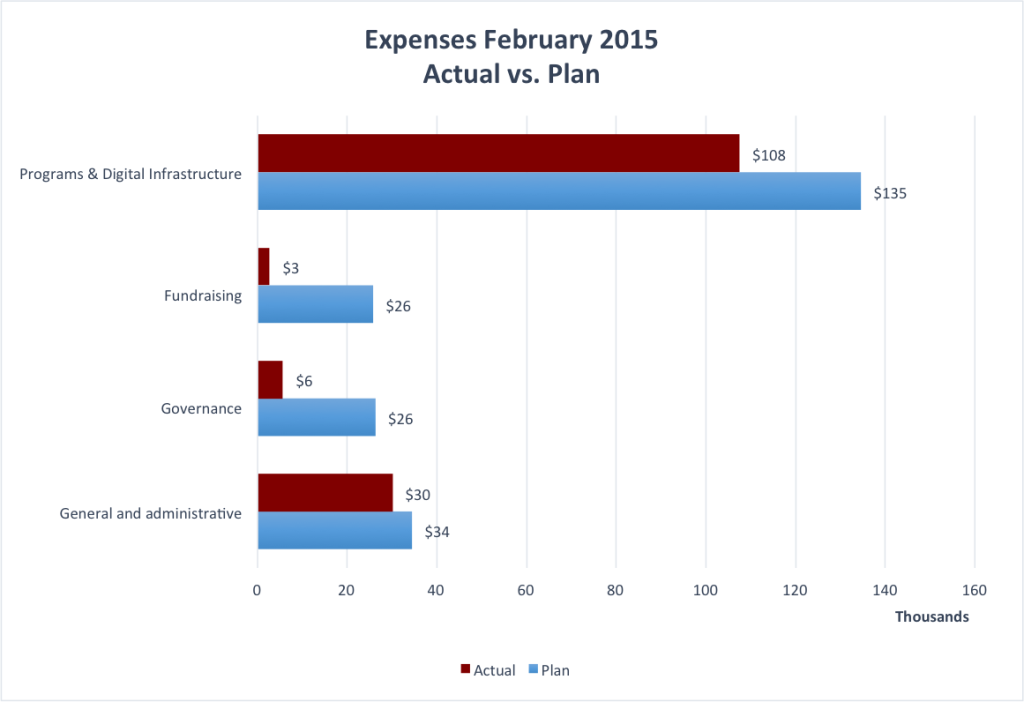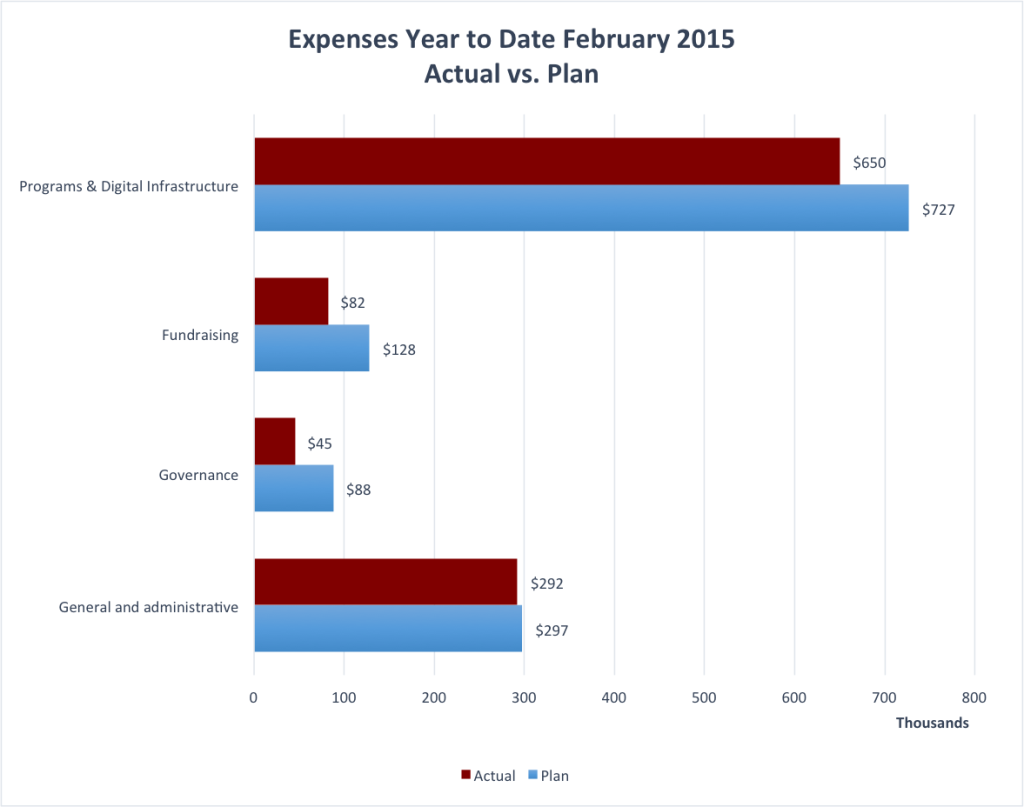Highlights
- Wiki Ed signed partnership agreements with the National Women’s Studies Association, Association for Psychological Science, and Communication across the Curriculum at Louisiana State University. These partnerships help us target our outreach to course topics related to Wikipedia’s content gaps.
- During a planning sprint in Seattle, Sage and LiAnna laid the foundation for digital infrastructure improvements. Supported by an additional $300K grant provided by the Stanton Foundation, Wiki Ed will transform its Assignment Design Wizard and Dashboard into a fully functional course management system. This will be independent of the EducationProgram MediaWiki extension that we’ve used for course pages until now, and will let us move past current limitations of Wikipedia’s course pages.
- Our student groups project kicked off with staff visits to the University of California Berkeley and the University of Arizona. Students at both schools have already created and expanded articles related to water and geology.
Programs
Educational Partnerships
Wiki Education Foundation has formalized agreements with the following educational partners:
- National Women’s Studies Association (NWSA): Executive Director Allison Kimmich and other staff have launched a Wikipedia initiative to encourage NWSA members to join our Classroom Program. NWSA promotes the production and dissemination of knowledge about women and gender. Improving missing or misrepresented information on Wikipedia helps reach this goal.
- Association for Psychological Science (APS): APS has had a Wikipedia Initiative for several years, and will collaborate with us to increase the quality of students’ contributions, identify missing articles, and support students through the editing process. We’re excited to work with Teaching Fellow Dr. Alexandra Kincannon to continue improving this initiative.
- Communication across the Curriculum at Louisiana State University (CxC): CxC works with instructors to incorporate Wikipedia editing as a communication-intensive assignment at LSU. CxC faculty help expand our program through outreach, assist instructors in assignment design, and maintain a peer mentorship program to help student editors with writing, research, and communication skills. Associate Director Rebecca Burdette and College of Science Coordinator Dr. Becky Carmichael have been essential for establishing this partnership at CxC. We’re looking forward to growing LSU’s impact on Wikipedia together.
In February, Jami traveled to Cambridge, MA to present at the National Women’s Studies Association Regional Meeting. Attendees included instructors from women’s, gender, and sexuality departments across the Northeast. Jami hosted two workshops about developing Wikipedia assignments to improve gender-related content gaps on Wikipedia. We’re excited about the traction our program is receiving in this field. NWSA shared the following feedback about their initiative:
- “I didn’t know some of the information about Wikipedia and found it surprisingly helpful. This will be invaluable as I work with students who want to know ‘why not cite Wikipedia as an academic source’ as well as those who are looking for a good project in, say, fem theory class or senior research.”
- “I found this really engaging, practical and informative. I will certainly give a workshop on it for faculty and implement in my class.”
- “It was a fantastic workshop. I left with some ideas on how to revise my Research Writing course (which typically has a gender focus), and Jami and I will hopefully be able to work on implementing those changes this fall.”
Classroom Program
Current status of the Classroom Program (spring term 2015) in numbers, as of 28 February 2015:
- 79 Wiki Ed-supported courses have course pages
- 42 of the 79 classes (53%) are taught by returning instructors
- 1248 student editorsare enrolled
- 719 (58%) of student editors have completed the online training
The spring 2015 semester is well underway, with 79 courses currently supported by Wiki Ed as of February 28. Another 20 are in various stages of preparation and we’re starting to welcome new classes in schools which operate on quarterly schedules. We kept busy onboarding classes and helping instructors to get their classes off to a good start. We’ve also been providing feedback and other forms of support to students and instructors as they develop content in their sandboxes, discuss improvements on talk pages, or in some cases begin to contribute to articles directly.
Students in most classes are still in the early stages of their assignments, but there have been several good contributions to articles and a great deal of promising work in student sandboxes. For example, The Columbus Basin, Polyforum Cultural Siqueiros, The Geology of Southern North Sea, Heinz Warneke, and Tessera (Venus).
Communications
We’ve expanded our training tools this month, starting to develop two additional subject-specific brochures and creating a new online student training.
The new subject-specific brochures will help students edit articles in Ecology and Women’s Studies. The Women’s Studies brochure goes hand-in-hand with our NWSA partnership. We’re currently seeking community feedback on the materials, and look to publish both brochures in March.
We’ve added a translation course option to the Assignment Design Wizard. Now, instructors working on translation courses can create a course page from the Wizard. We’e also created a streamlined online training for students catered specifically to translation assignments. With these tools, Wiki Ed offers support to classes that share more cross-cultural content.
We’ve expanded our website to present clear, accessible information about Wiki Ed’s programmatic activities and impact. It’s also been an ambitious month on the blog. We’ve shared a three-part interview with Char Booth, the Director of Research, Teaching, and Learning Services at the Claremont Colleges Library. There’s a book review, a class profile and a student profile, among other topics. The Times Free Pressinterviewed Eryk for a story on academia’s relationship to Wikipedia.
Blog posts:
- The Roundup: Grab your popcorn (February 2)
- Information privilege and Wikipedia: a conversation with Char Booth (part 1) (February 2)
- Learning through Wikipedia: a conversation with Char Booth (part 2) (February 4)
- This Fall, 68% of our student editors were women (February 5)
- Wiki Ed’s student groups pilot kicks off (February 5)
- The Wikipedia assignment: a conversation with Char Booth (part 3) (February 6)
- WikiEdu Dashboard version 1.0 is live! (February 6)
- The Roundup: History of the American West (February 9)
- Expanding African Archaeology (February 11)
- We’re Hiring! (February 11)
- Monthly report for January 2015 (February 12)
- Translation courses: sharing the world through Wikipedia (February 13)
- The Roundup: The cost of news (February 16)
- The Gender Gap: A Student’s Take (February 18)
- The Roundup: Tech Talk (February 23)
- The benefits of Wikipedia assignments for photography courses (February 24)
- Authority, Play, and Information Literacy in “Wikipedia U.” (February 25)
News coverage:
- Casey Phillips, “Wikipedia no longer seen – even by educators – as a den of info iniquity“, Times Free Press (February 6)
- Adeline Koh, “Integrating Wikipedia in Your Courses: Tips and Tricks“, Chronicle of Higher Education (February 18)
Digital Infrastructure
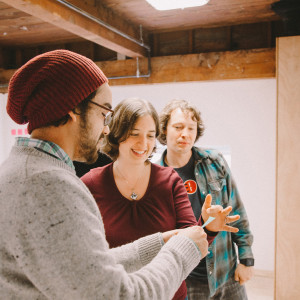
Following the successful launch of dashboard.wikiedu.org, we focused on preparing for Wiki Education Foundation’s longer term digital infrastructure work. In the first week of February, Director of Programs LiAnna Davis joined Product Manager Sage Ross in Seattle to conduct a planning sprint with our development partner WINTR. During this sprint, we discussed our roadmap for the next year. Our top priority is transforming our Assignment Design Wizard and Dashboard into a fully functional course-management system, independent of the EducationProgram MediaWiki extension that we’ve used for course pages until now. This new course platform will begin development in early March for launch before the Autumn 2015 term. Once it is launched, we’ll be able to move past the major limitations of our current course pages. While in Seattle, Sage and LiAnna also hosted a meet-up with local editors in the Wikimedia Cascadia user group.
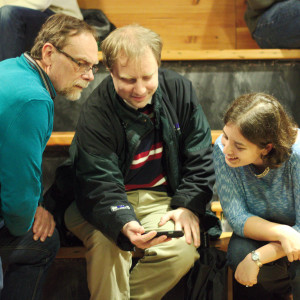
Sage worked on improvements to the Assignment Design Wizard, fixing several bugs and adding support for a new assignment type: article translation. He also worked on better documentation and more complete testing of the Dashboard codebase, in preparation for the resumption of development in March.
Research and development
Outreach to high-achieving students
In February, Wiki Ed Executive Director Frank Schulenburg and Samantha Erickson traveled to visit two student groups as part of the pilot program. The workshops and accompanying student activities give students Wikipedia training related to their field of study.
The first stop was at the University of California, Berkeley, where Frank and Samantha met with the Berkeley Water Group Idea Lab. The group provides a multidisciplinary platform for students studying political science, engineering, environmental economics and policy, and more, to discuss topics related to water, sanitation, and hygiene. The workshop hosted 10 BWGIL members and resulted in new edits to articles like sulfur water and the Crystal Springs Dam.
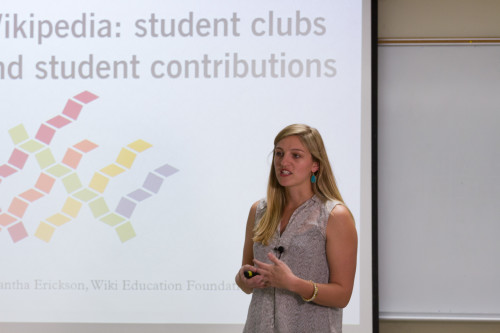
The second stop was at the University of Arizona in Tucson, Arizona, where Frank and Samantha met with the Geo Club, a group of graduate students studying the geological sciences in all its forms: from tectonics and geochemisty, to paleoclimate, mineralogy, and paleontology. Students at the University of Arizona have unique access to mineral research and information, as the university houses 3,000 of the known 4,900 minerals, and oversees the production of RRUFF, the American Mineralist Crystal Structure Database. Student editor Shaunna Morrison has used her access to this information to create the Wikipedia page for Kovdorskite as well as edit pages on Lanthanite, Agardite, and Mixite. The workshop hosted members of the Geo Club as they learned the basics of Wikipedia editing. The next day, 15 members of the Geo Club visited Kartchner Caverns State Park, where we researched cave phenomena and photographed geologic occurrences above ground.
Finance & Administration / Fundraising
Finance & Administration
For the month of February, expenses were $146,011 versus the plan of $221,143. The majority of $75k variance is due to deferred events (fundraising, workshops, and strategic planning).
Year-To-Date expenses are $1,069,707 versus the plan of $1,240,265. Included in the $170k year-to-date variance are the deferred events that accounted for the month’s $75k variance; the ongoing savings from the timing of staff hires ($55k); and deferred travel expense ($35k).
Fundraising
In late February, Wiki Ed received an additional $300,000 in funding, and $1,079,000 for year-two funding, from the Stanton Foundation. The $300,000 covers the creation of a new course page system to replace the outdated “Education Program Extension” on Wikipedia. As Sage Ross has finished work on digital infrastructure nearly two quarters ahead of schedule, Wiki Ed can begin working on this project immediately. The new course page system will ensure long-term sustainability for the technical solution that our Classroom Program relies on. It will be built in cooperation with our tech contractors, WINTR, in Seattle. The $1,079,000 for year two is part of a three-year commitment from Stanton to support Wiki Ed’s work through unrestricted grants at a level of 90% in year one, 70% in year two, and 50% in year three.
Office of the ED
- Current priorities:
- Preparing the March strategy kick-off event in San Francisco
- Supporting the outreach to high achieving students pilot
- In February, Frank prepared the strategy and annual planning process, which will kick off with an in-person meeting on March 23. This included gathering input from staff and senior management, preparing documents with background information about Wiki Ed’s external environment and its current resource base, discussing the process and the expected outcome with board members, and recruiting external advisors.
- As part of the outreach to high achieving students pilot, Frank supported Samantha’s work with student groups at the University of California, Berkeley, and at the University of Arizona in Tucson.
Visitors and Guests
- Liz Williams, Collaboration Zone
- Tighe Flanagan, Wikimedia Foundation
